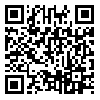Volume 7, Issue 4 (2-2020)
jmsthums 2020, 7(4): 1-10 |
Back to browse issues page
Download citation:
BibTeX | RIS | EndNote | Medlars | ProCite | Reference Manager | RefWorks
Send citation to:



BibTeX | RIS | EndNote | Medlars | ProCite | Reference Manager | RefWorks
Send citation to:
R J, N G, S M, H F. The effect of menstrual health education in peer group on menstrual health behaviors in adolescents: A randomized clinical trial study. jmsthums 2020; 7 (4) :1-10
URL: http://jms.thums.ac.ir/article-1-661-en.html
URL: http://jms.thums.ac.ir/article-1-661-en.html
1- Department of Midwifery, School of Nursing and Midwifery, Mashhad University of Medical Sciences, Mashhad, Iran
2- Nursing and Midwifery Care Research Center, Mashhad University of Medical Sciences, Mashhad, Iran
3- Department of Nursing, Tabas Faculty of Nursing, Birjand University of Medical Sciences, Birjand, Iran
2- Nursing and Midwifery Care Research Center, Mashhad University of Medical Sciences, Mashhad, Iran
3- Department of Nursing, Tabas Faculty of Nursing, Birjand University of Medical Sciences, Birjand, Iran
Abstract: (5475 Views)
Background & Aim: Most girls are unaware of menstrual changes and may be having trouble getting inadequate information from sources. Menstrual health is an important aspect of adolescent health. The aim of this study was to investigate the effect of menstrual health education in peer group on menstrual health behaviors in adolescents.
Methods: This randomized clinical trial study was conducted on 60 high school students with regular menstrual cycles in two groups of peers and control. From high schools in Mashhad, two schools were assigned to be one of the two mentioned groups by drawing. In peer group, educational content (Including five menstrual health areas) was explained to 10 students and then six of them were selected and asked to teach to 4-7 of their classmates. Control group received routine training in the form of lecture. Data were collected by a questionnaire of menstrual health behaviors, before intervention, after the end of first and second menstrual cycle and were analyzed by Mann- Whitney, Chi square and independent samples t-test. The confidence level was 95% and the significance level was 0.05.
Results: Two groups were similar in age (p = 0.124). In both groups, mean score of menstrual health behaviors was significantly increased (p <0.001). Mean score of menstrual health behaviors in peer group, was significantly higher than control group (p <0.001).
Conclusion: Due to the effectiveness of peer-based teaching method in promoting adolescent girls' menstrual behaviors compared to control group, this method is recommended for health planners to educate about health issues including menstrual health.
Methods: This randomized clinical trial study was conducted on 60 high school students with regular menstrual cycles in two groups of peers and control. From high schools in Mashhad, two schools were assigned to be one of the two mentioned groups by drawing. In peer group, educational content (Including five menstrual health areas) was explained to 10 students and then six of them were selected and asked to teach to 4-7 of their classmates. Control group received routine training in the form of lecture. Data were collected by a questionnaire of menstrual health behaviors, before intervention, after the end of first and second menstrual cycle and were analyzed by Mann- Whitney, Chi square and independent samples t-test. The confidence level was 95% and the significance level was 0.05.
Results: Two groups were similar in age (p = 0.124). In both groups, mean score of menstrual health behaviors was significantly increased (p <0.001). Mean score of menstrual health behaviors in peer group, was significantly higher than control group (p <0.001).
Conclusion: Due to the effectiveness of peer-based teaching method in promoting adolescent girls' menstrual behaviors compared to control group, this method is recommended for health planners to educate about health issues including menstrual health.
Type of Study: Research |
Subject:
General
Received: 2019/07/10 | Accepted: 2020/04/10 | Published: 2020/05/14
Received: 2019/07/10 | Accepted: 2020/04/10 | Published: 2020/05/14
Send email to the article author
| Rights and permissions | |
 | This work is licensed under a Creative Commons Attribution-NonCommercial 4.0 International License. |






